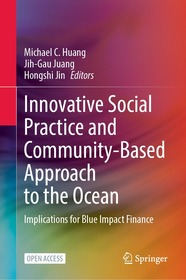
Innovative Social Practice and Community-Based Approach to the Ocean
Implications for Blue Impact Finance
-
12% KEDVEZMÉNY?
- A kedvezmény csak az 'Értesítés a kedvenc témákról' hírlevelünk címzettjeinek rendeléseire érvényes.
- Kiadói listaár EUR 53.49
-
22 184 Ft (21 128 Ft + 5% áfa)
Az ár azért becsült, mert a rendelés pillanatában nem lehet pontosan tudni, hogy a beérkezéskor milyen lesz a forint árfolyama az adott termék eredeti devizájához képest. Ha a forint romlana, kissé többet, ha javulna, kissé kevesebbet kell majd fizetnie.
- Kedvezmény(ek) 12% (cc. 2 662 Ft off)
- Kedvezményes ár 19 522 Ft (18 593 Ft + 5% áfa)
Iratkozzon fel most és részesüljön kedvezőbb árainkból!
Feliratkozom
22 184 Ft

Beszerezhetőség
Még nem jelent meg, de rendelhető. A megjelenéstől számított néhány héten belül megérkezik.
Why don't you give exact delivery time?
A beszerzés időigényét az eddigi tapasztalatokra alapozva adjuk meg. Azért becsült, mert a terméket külföldről hozzuk be, így a kiadó kiszolgálásának pillanatnyi gyorsaságától is függ. A megadottnál gyorsabb és lassabb szállítás is elképzelhető, de mindent megteszünk, hogy Ön a lehető leghamarabb jusson hozzá a termékhez.
A termék adatai:
- Kiadó Springer Nature Singapore
- Megjelenés dátuma 2025. október 2.
- Kötetek száma 1 pieces, Book
- ISBN 9789819691036
- Kötéstípus Keménykötés
- Terjedelem256 oldal
- Méret 235x155 mm
- Nyelv angol
- Illusztrációk XIV, 256 p. 75 illus., 59 illus. in color. Illustrations, black & white 700
Kategóriák
Hosszú leírás:
"
This book stands as a pioneering work, illustrating a community-based and people-centered approach to the ocean. It meticulously outlines methodologies, procedures, and evaluations of social practices initiated by universities and think tanks, rooted in the actualization of social responsibility. Its outcomes extend towards implications for blue impact finance, highlighting a dedicated commitment to fostering positive change in oceanic environments.
Universities play a vital role in bridging research and education to create innovative solutions for communities as partnerships. Japan and Taiwan share similar concerns as maritime states and recognize that collaboration is the linchpin for strengthening relationships among faculty, students, and local residents, ensuring sustainability with a positive societal impact. To address this issue, the Ocean Policy Research Institute (OPRI) of the Sasakawa Peace Foundation collaborates with the Taiwan–Japan Alliance of Local Revitalization and Social Practice and the National Taiwan Ocean University. Through this joint effort, thematic case studies are selected to illuminate the methodology of impact assessment and evaluation for ocean-link initiatives within the framework of think tank–university social responsibility.
This book contains four key parts: I. Methodology of Problem-solving Structure for Coastal Region; II. Challenges and Opportunities of Ocean-link Industries; III. Innovative Forms of Blue Impact; and IV. Evaluating Blue Impact from Social and Environmental Perspective. Successful experiences have been shown to rely on problem identification, assessment, and endeavor, driven by shared motivations and the establishment of trust among research institutes, universities, and communities.
This is an open access book.
" TöbbTartalomjegyzék:
"
Chapter 1. Overview – Assessing the “Blue Impact” of Community-based ocean-related projects and the role of Think Tank – University Social Responsibility (Michael C. Huang, Jih-Gau Juang, Hongshi Jin).- Part I: Methodology of Problem-solving Structure for Coastal Region.- Chapter 2. Using a Logic Model to Assess the Social Impact of USR: How Universities Contribute to Local Communities (Kenji Okamura and Shingo Akaike).- Chapter 3. Using Jobs Theory to evaluate the use of mobile off-grid architecture (MOA) as a means of regional revitalization (Shota Tajima).- Part II: Challenges and Opportunities of Ocean-link Industries.- Chapter 4. Challenges Facing Ocean Education in Japanese Schools (Sachiko Oguma).- Chapter 5. Regional Revitalization through Development of Taiwan's Yachting Industry: Challenges and Opportunities (Hsueh-wen Chow, Weilin Lee Weiming Chen, and Jyh-Yeuan Lo).- Chapter 6. Creation of new industries using Blue Tech: The Challenge of Marine Open Innovation in Japan (Masahiro Hashimoto).- Part III: Innovative Forms of Blue Impact.- Chapter 7. A People-Centered Approach: The Case of Community-Based Eco-Tourism in Palau (Li-Yun Hsu and Hideyuki Shiozawa).- Chapter 8. Dynamic Material Culture and Digital Preservation: A case study of the Talugan Bunun Cultural Relics Museum (Ching-Ying Tung).- Part IV: Evaluating Blue Impact from Social and Environmental Perspective.- Chapter 9. Application of the Sustainable Livelihoods Framework to Analyze the Effect of the USR Program: A Case Study of the Badouzi Fishing Village (Hui-Chiao Wang).- Chapter 10. University–Community Engagement in Advancing Sustainable Fishing Village Development: A Case Study of a Successful Excellent Fishing Neighborhood Build-Up Project (Ching-Yu Yang, Wen-Hong Liu, Hsiao-Chien Lee, and Chih-Cheng Lin).- Chapter 11. Sustainable Financing for Marine Protected Areas (MPAs): A Case Study of the Shiretoko Natural World Heritage Site (Miko Maekawa, Junko Toyoshima, and Mitsutaku Makino).- Chapter 12. Digital Narratives of the Matsu Islands: A Case Study of Theme-Based Travel Planning by University Students in Taiwan (Cheng-Yi Eric Lin, Sheng-Wen Tseng).- Editorial Afterword: Towards Community-Based Maritime Countries (Ming-Hao Yang).
" Több



